This morning Midnight Rider director Randall Miller not only pleaded guilty to criminal trespass and involuntary manslaughter in the accidental death of Sarah Jones last year, but accepted a two-year prison term (he’ll probably walk after a year) and 10 years probation, during which time Miller agreed “not to serve as a director, a assistant director or a supervisor in charge of safety on any film production.” Miller’s rep is toast in this town anyway but now he’s essentially agreed to fold his directing career. It’s theoretically possible that he could return to filmmaking in 2025 but what are the odds? In taking the deal Miller has at least spared his wife, Jody Slavin, from prosecution. Their grief aside, Jones’ family and friends are probably now feeling a certain closure. Miller’s admitted indifference to safety procedures led to Jones’ death, and now that disregard has pretty much killed his career.
Goes With The Territory
I felt appalled last night when I watched this TMZ video showing the death of Terry Carter during the 1.29 Suge Knight altercation in Compton. My initial thought was to ignore it out of general disdain for the gun-toting bluster and territorial machismo that has long been an aspect of rap and hip-hop culture, particularly when Knight has been around. Knight apparently was being threatened by a security guy waving a gun but who reacts this crazily? This is Zapruder-level and about as revolting as it gets. Knight’s temper or pathology have no direct connection, of course, with F. Gary Gray‘s N.W.A. biopic Straight Outta Compton (Universal, 8.14), but Knight was reportedly in the area because a trailer for the film was being shot and Knight wanted to speak to former N.W.A. member Dr. Dre about his likeness being used in the film. Hair-trigger violence seems to happen a lot in that general realm. Five days after filming began last August a drive-by shooting occured.
“Somewhat Lighthearted”?
Two words in a N.Y. Times, Michael Cieply-authored piece about Warren Beatty‘s still-untitled Howard Hughes film — “somewhat lighthearted” — have altered perceptions about what kind of film it might be. Or my perceptions, at least. I’m sorry but the word “light” scares me. I’m a much bigger fan of films that go for “dry” or “mildly subversive” or “even-toned” or “Antonioni-esque” or “haunted” or something along those lines.
In my mind “somewhat lighthearted” means a little bit swoony and gentile. It indicates a kind of audience-friendly attitude, one that it might even flirt with frothy from time to time. It suggests a film that doesn’t want to frown or brood, that doesn’t want to be cloudy or provocative or open any closets with skeletons.
That’s not to say that Beatty’s film will necessarily conform to these descriptions. I know nothing. It may be a whole ‘nother animal. But if I know Mr. Beatty’s tendencies as a scenarist (and I do) it’ll definitely deliver an emotional payoff during Act Three.
The film may be released this year but who knows? Cieply reports that while New Regency Pictures, which is producing the $30 million venture with Beatty, releases its films through 20th Century Fox or Fox Searchlight, “people briefed on the situation said decisions about the scope, timing and precise vehicle for the film can be answered only when the movie is finally seen.”
Beatty’s only quote in the Cieply piece: “I would appreciate if you would say Mr. Beatty good-naturedly declined to comment.” Totally typical.
Hot Potato
In my usual haste I missed last Tuesday’s announcement that the title of Steven Spielberg‘s fact-based spy drama is now Bridge of Spies (Disney/Touchstone, 10.16) and no longer St. James Place. The title refers to a famous bridge used by the Americans and Soviets for exchange of captured spies during the Cold War. Spielberg’s film is about the U-2 spy plane incident of May 1960 when CIA surveillance pilot Francis Gary Powers was shot down by the Soviets. Powers was sentenced to ten years in the slam but American lawyer James Donovan (Tom Hanks) eventually negotiated his release. On 2.10.62 a Glienicke Bridge swap happened with Powers exchanged for Soviet spy Colonel Rudolf Abel.
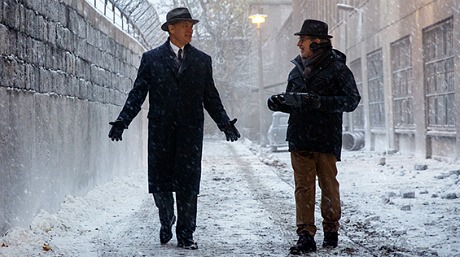
Tom Hanks, Steven Spielberg during filming of Bridge of Spies.
John Le Carre‘s Karla, the senior Soviet intelligence officer who was the prime antagonist of George Smiley, defected across the Glienicke bridge, which spanned between West Berlin and the former Eastern bloc suburb of Potsdam.
Before and after my 5.11.12 visit to Studio Babelsberg I walked around Potsdam and got a certain feel for the place so don’t tell me. It was nice and warm that day. I felt peaceful, at home.
Are you sensing from all this what Bridges of Spies is going to be like? It’s going to be a kind of respectable HBO-level period drama in which this happens and then that happens and then this happens and then that happens, and then Hanks finally arranges for the swap and Powers is finally free. Spielberg fans will happy to know that John Williams is writing the score for Bridge of Spies. It will be his 27th Spielberg collaboration.
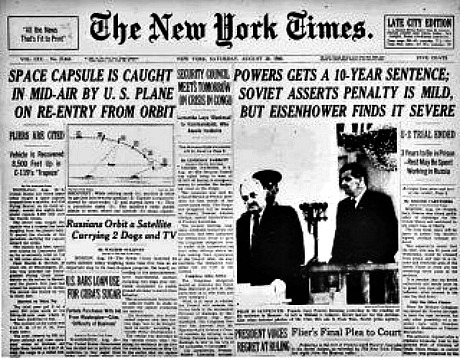
Too Calculating By Half?
A week and a half ago I added Tom Hooper‘s The Danish Girl (Focus Features, 11.27) to HE’s list of likely Oscar pedigree contenders. The presumption was that Eddie Redmayne‘s portrayal of Einar Wegener/Lili Elbe will be “obvious catnip for Academy voters,” as Deadline‘s Pete Hammond commented in a 2016 Oscar forecast piece that ran on 3.6. At the same time I was thinking that an Oscar-winning actor donning a wig, eyeliner and falsies to play a transgender pioneer seemed almost too Oscar-baity and calculating. Everyone is thinking this, I’m sure. On the other hand I figured “okay, don’t get too wound up…breathe out, calm down.”
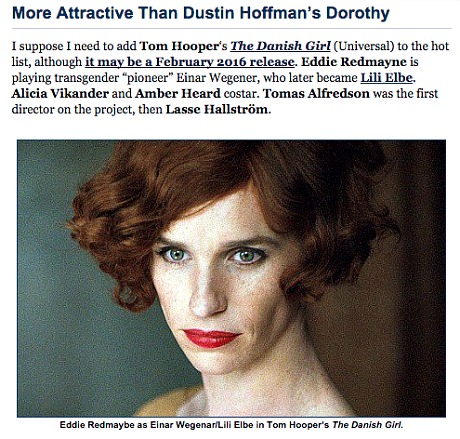
Tom Hooper’s The Danish Girl was initially listed in the IMDB as a February 2016 release, but on 3.4 Focus Features announced that it will open domestically on 11.27.15.
At the same time I was suppressing a notion that underneath that ubiquitous photo of Redmayne-as-Wegener is an invisible caption-quote that reads “how are you going to deny me a nomination for this, despite my having just won for The Theory of Everything?” As Hammond remarks, Redmayne’s all-but-assured Best Actor nomination for The Danish Girl will “position him for the rare feat of back-to-back Best Actor wins, something not accomplished since Tom Hanks in 1993 and ’94 for Philadelphia and Forrest Gump.”
Spielberg-Pratt Indy Buzz Stall-Out
A few weeks ago Deadline‘s Mike Fleming reported that “Steven Spielberg wants Chris Pratt to anchor the rebirth of Indiana Jones that is being developed at Disney.” It’s very early in the process, he acknowledged, but “it makes a lot of sense [as] Pratt was Spielberg’s hand-picked choice to be the star of Jurassic World.”
Yesterday a knowledgable guy with good sources reminded or clarified that “there is no announced reboot of Indiana Jones with Spielberg and Pratt. I am 100% sure [of this] based on my own first-hand knowledge of what they’re actually doing with that franchise. There is no current Indy in development. At all. Until Spielberg and Harrison Ford both tell Disney/Lucasfilm that they are not interested in making another film, no decisions will be made, and no meetings will be set. With anyone. At all.”
McCarthy’s Cannes Projections
Yesterday Hollywood Reporter critic Todd McCarthy mentioned a couple of dozen interesting possibilities for the 2015 Cannes Film Festival (5.13 to 5.24), which is only nine weeks away. McCarthy starts with two locks I’ve heard about myself — Todd Haynes‘ Carol, a period lesbian romance, adapted from Patricia Highsmith‘s “The Price of Salt,” with Cate Blanchett and Rooney Mara, and George Miller‘s Mad Max: Fury Road, a likely festival opener as it debuts in France on 5.13 and stateside two days later. McCarthy is also more or less predicting that Brad Bird‘s Tomorrowland, which will open in the U.S. on 5.22, will make the trek.
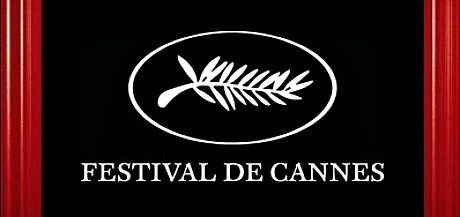
I’m not saying these are the hottest attractions, but they’re the first three to be more or less vaguely confirmed for Cannes, and I for one am feeling underwhelmed. Mad Max is fierce popcorn, Tomorrowland might very possibly be infected with the meandering mood virus of co-producer and co-writer Damon Lindelof, and Carol…okay, maybe, but it’s not gobsmacky enough.
I’m just going to offer a suggestion for the hell of it: Thomas McCarthy‘s Spotlight, the drama about the Boston Globe‘s 2001 investigation of sexual molestation by Catholic priests with costars Mark Ruffalo, Liev Schrieber, Johnny Slattery, Jamey Sheridan, Michael Keaton, Rachel McAdams, Billy Crudup and Stanley Tucci. Financed by Participant Media and due to be U.S.-distributed by Open Road, Spotlight is just low-profile and modest-sounding enough for Open Road to perhaps seek out an agreeable bump from Cannes that will help it stand up to the competition during award season. Plus McCarthy needs to remind the industry that he’s not the guy who directed The Cobbler, the Adam Sandler film that wiped out in Toronto, but a guy who’s got his mojo back with a moralistic journalism drama.
“It’s No Good With Us, Milt. It’s Never Been Any Good.”
I’ve mentioned repeatedly that I’m a total fool for color photography taken during the shooting of classic black-and-white films. Today I happened upon this snap of Fred Zinneman and crew shooting the breakup scene between Deborah Kerr‘s Karen Holmes and Burt Lancaster‘s Milt Warden during the filming of From Here To Eternity in Oahu. The shot below was taken by yours truly in May 2001 during a break from my coverage of the Pearl Harbor junket. The location is Halona Cove on the southeast coast of Oahu, where the famous sexy beach love scene between Lancaster and Kerr was filmed.
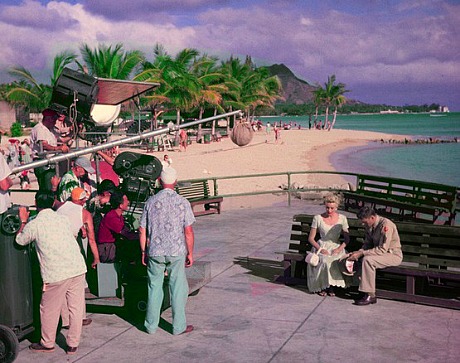
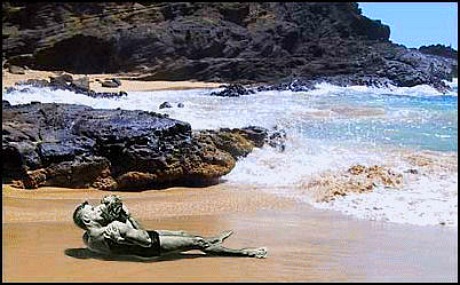
Chat With Abel
A couple of days ago director Abel Ferrara didn’t call, as scheduled, to discuss his dispute with Wild Bunch honcho Vincent Maraval and IFC Sundance Selects over the decision to offer an R-rated cut of Welcome To New York on 3.27 (theatrical and VOD) instead of Ferrara’s original cut, which Ferrara believes was contractually guaranteed to be shown. But Ferrara did call today and so we kicked it around for 15 minutes or so. Ferrara insisted that he hasn’t worked without final cut “for the last 30 years” and that his final-cut rights are absolute and sacrosanct. He said that Maraval’s characterization of him as a tempestuous artist who compulsively “bites the hand” is “bullshit.”
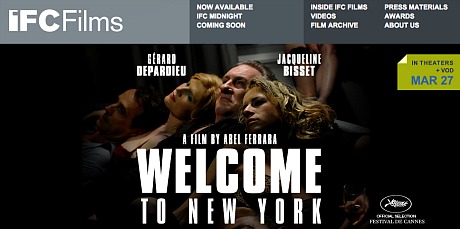
During our chat Ferrara sent along the following statement: “As a filmmaker and a human being I detest the destruction of my film Welcome to New York, which is now being distributed by IFC and Wild Bunch and exhibited on Showtime and in IFC theatres. Behind all these entities are individuals, in this case Arianna Bocco, Jonathan Sehring and Vincent Maraval, who feel they can deny my contractual right of final cut, which is simply my freedom of expression. Some people wear hoods and carry automatic weapons; others sit behind their desks but the attack and attempted suppression of the rights of the individual are the same. I will defend the right of free speech until the end and I ask all who believe as I do to not support the showing of this film, on their networks, in their theatres, or wherever.”
Happiness Is
A happy life is, I think, mainly about serenity, discipline, curiosity and the right kind of stimulation. Either you’re curious about stuff or you’re not, and “the right kind of stimulation” obviously means everything except drugs, alcohol and compulsive eating. Serenity has many ingredients, but I tend to define it as good enough, taking care of yourself, great theatre, soul-stirring music, nothing terrible or toxic, bills paid on time, healthy food, exercise, long walks in big cities, great cappucino, spirituality if you want it, even-keel relationships, et. al.
The problem for most people, I suspect, is that the kind of happiness they knew or at least occasionally tasted in their late teens and early 20s resulted from the riding of a special kind of spiritual wave with really close friends, good drugs, breathtaking sex, etc. This kind of life led at times to feelings of joy, ecstasy and even a form of transcendent satori, but it simply can’t be sustained when you embark on your solo journey to adulthood and have to start focusing and getting ahead and shouldering responsibilities.
Most adults aren’t fully honest when you ask them if they’re “happy”, but if they were they’d probably answer, “Well, yeah, mostly…I mean, I was truly happy at times during my sex, drugs and rock ‘n’ roll days but that stuff’ll kill you.”
Why Not Now?
From a 9.11.14 Toronto Film Festival review by Indiewire‘s Kevin Jagernauth: “With a premise based on the salacious murder trial of Amanda Knox, the most curious aspect of Michael Winterbottom‘s The Face Of An Angel is that it’s not about the case at all. Instead, the filmmaker takes a self-indulgent approach, reorienting the project to tell the story of a director (Daniel Bruhl) researching and writing a movie about the sensational crime and who promptly begins to spiral out of control the more he keeps digging for the truth. A mismatch of genres, coupled with a pretentious attitude regarding the art of moviemaking, this film strains for significance, referencing Dante in the same breath as Knox.
Winterbottom’s film will open later this month in England, and on 6.30 in the States. Almost four months from now? We’re living through a dull, dispiriting season. It should appear concurrent with the British release.
“Shot by Hubert Taczanowski (The Look Of Love, The Opposite Of Sex), the film is visually lifeless, [using] a grimy visual palette that matches Bruhl’s perma-sour demeanor. And the overall tone never coheres, partially due to the shifting nature of the triptych-ish structure. The film’s auntish indictment of tabloid culture is tedious, and as a portrait of an artist grappling with truth and his own personal demons, Thomas just isn’t all that interesting. He’s his own worst enemy, and it’s hard to care about what he’s going through if he doesn’t either.


